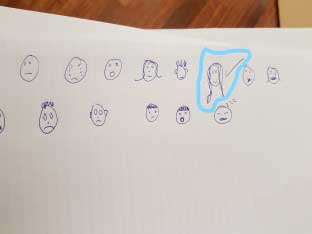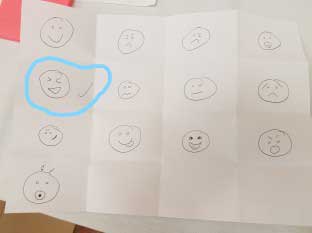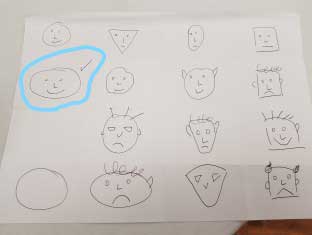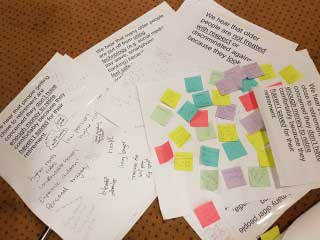It was great to be so warmly welcomed to the first national Age-friendly Communities forum hosted by the Office for Seniors in the Grand Hall at Parliament.
Approximately 150 representatives from local and central government, non-governmental organisations and community groups met to focus on making New Zealand an age friendly place to live.
Members of the Service Innovation Lab team were delighted to be asked to lead a workshop. We aimed to give the group a taste of co-design which is an important part of how we work with government and other agencies to design services for New Zealanders that are easier to use. The design process is really important and this co-design approach can be applied to a wide range of problem-solving.
About 80 people took their seats and the fun began with a whole-of-audience ideation exercise. The participants folded a piece of paper to create a grid of 16 squares and were given two minutes to draw as many different faces as possible (one face per square). The emphasis was on the quantity of faces rather than the quality. After two minutes there was a high volume and diverse range of faces drawn. Participants reviewed their work and highlighted their favourite face.



Take-aways from the exercise:
- When brainstorming it is best not to fall in love with your first idea and stop, as it is unlikely to be your favourite on reflection.
- Even when you are given the same instructions, working individually or in silos results in individual and siloed interpretation of the instructions.
- Imagine the ideas we could come up with if we combined our creativity.
- The value of a time limit and the number of ideas that can be generated with focus and permission to do so.
The second half of the workshop focused on five observations from the community about ageing and generated ideas on causes and potential concepts.

People are born collaborators who relish the chance to share their stories about things they care about. We saw this in the joy people had when sharing what they thought were the causes of the problems they identified and when people contributed their ideas on how to address the causes. Giving people permission or finding a way to share their voice and contribute is key to finding solutions.
A recurring theme was “how to get started”. We’ve become pre-conditioned to have the ‘right’ answer, failure is, well, failure and we are quick to rule out what is possible and what is not.
We achieved a lot in short time when people stopped worrying about ‘is this the right cause or solution’ and focused on what they knew and shared that with each other. This also showed people that everyone has different experiences and so we all bring something different to the table. It also confirms there is probably never the right solution, and a range of things will be necessary to solve some of the big problems we face.
The active participation, enthusiasm and willingness of this community to make a difference was awesome. The groups explored techniques such as silent brainstorming, mind maps, themed post-its and group discussions to clarify and gain a common understanding. There was a lot of content generated in just 20 minutes by using the right techniques.
Attendees want the conversation and collaboration to continue. Outputs from the forum will be available over the coming weeks via www.superseniors.msd.govt.nz (For enquiries about the Age-friendly Community forum contact osc@msd.govt.nz).
It was exciting to see the interest in exploring the insights further and the number of groups wanting to bring co-design into their organisations.
It was an enjoyable and insightful session that achieved its purpose of providing a taster. However we also learned the environment has a big impact on the value possible. Other lessons learned:
- Venue: It had its challenges as we couldn’t use wall space, there was limited room for tables or display boards for the group collaboration exercise and we couldn’t rearrange furniture. Many participants found it difficult to hear and see.
- Experience: Next time it would help to provide handouts of process and brainstorming topics to mitigate the environmental factors and the variety of individual needs.
The Service Innovation Lab team welcome visitors and teams to get involved in lab work. Send enquiries to ServiceInnovationLab@dia.govt.nz.
If you'd like to stay across the work coming out of the Service Innovation Lab, please join our mailing list.

